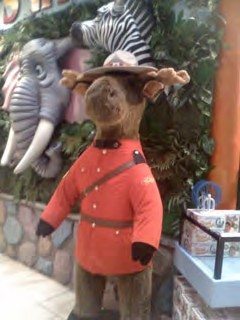by Lisa Bullard
 Once when flying back to the U.S. from Canada I met up with some zealous border control agents. The customs guy wanted a detailed description of what I’d purchased.
Once when flying back to the U.S. from Canada I met up with some zealous border control agents. The customs guy wanted a detailed description of what I’d purchased.
“I bought one of those souvenir snow globes with a little Mountie inside,” I said.
The guy thought a moment and then sadly shook his head. “Ma’am, if you’d played your cards right, you could have taken home the real thing.”
The immigration guy looked me up and down and then barked out, “What’s ‘Oshkosh?”’
“It’s either a small town in Wisconsin or a kind of overalls,” I said. I was hoping for a gold star, but instead he rolled his eyes and waved me through.
Years later I was telling a friend trained in security about this story. “Would he really have kept me from crossing the border if I had answered the Oshkosh question wrong?” I asked.
She laughed. “He didn’t care what you answered. He cared how you answered. He’s trained to know when someone is telling the truth or when they’re lying.”
Fiction writers are also heavily vested in the kind of truth that lies underneath the surface answer.
When student writers use real-life events as their inspiration, they often get worked up over “what really happened.” But this isn’t the task of fiction. Instead, fiction is all about reshaping “what really happened” to reveal to the reader some of the biggest truths of all: truths about life, truths about people.
Explain to your students that it’s okay to leave out some details, add others, change a few more, if it’s done with the goal of pointing the reader towards the emotional truth of the story. This isn’t crossing the border from “telling the truth” over to “lying.” It’s making important writing choices.
It’s digging down to the truth found underneath “Oshkosh.”
